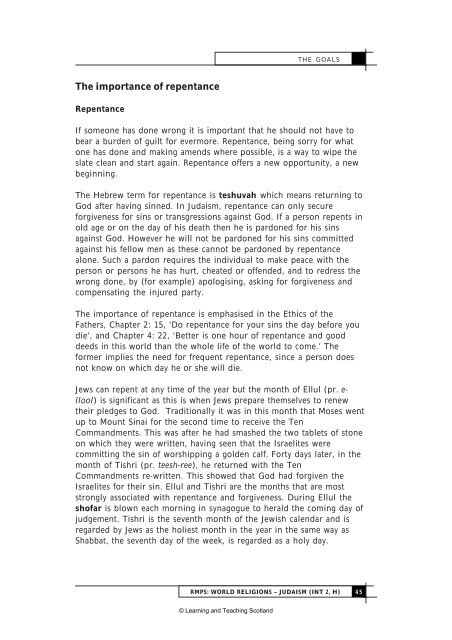RMPS - Int2/Higher - World Religions - Judaism - Education Scotland
RMPS - Int2/Higher - World Religions - Judaism - Education Scotland
RMPS - Int2/Higher - World Religions - Judaism - Education Scotland
You also want an ePaper? Increase the reach of your titles
YUMPU automatically turns print PDFs into web optimized ePapers that Google loves.
The importance of repentance<br />
Repentance<br />
THE GOALS<br />
If someone has done wrong it is important that he should not have to<br />
bear a burden of guilt for evermore. Repentance, being sorry for what<br />
one has done and making amends where possible, is a way to wipe the<br />
slate clean and start again. Repentance offers a new opportunity, a new<br />
beginning.<br />
The Hebrew term for repentance is teshuvah which means returning to<br />
God after having sinned. In <strong>Judaism</strong>, repentance can only secure<br />
forgiveness for sins or transgressions against God. If a person repents in<br />
old age or on the day of his death then he is pardoned for his sins<br />
against God. However he will not be pardoned for his sins committed<br />
against his fellow men as these cannot be pardoned by repentance<br />
alone. Such a pardon requires the individual to make peace with the<br />
person or persons he has hurt, cheated or offended, and to redress the<br />
wrong done, by (for example) apologising, asking for forgiveness and<br />
compensating the injured party.<br />
The importance of repentance is emphasised in the Ethics of the<br />
Fathers, Chapter 2: 15, ‘Do repentance for your sins the day before you<br />
die’, and Chapter 4: 22, ‘Better is one hour of repentance and good<br />
deeds in this world than the whole life of the world to come.’ The<br />
former implies the need for frequent repentance, since a person does<br />
not know on which day he or she will die.<br />
Jews can repent at any time of the year but the month of Ellul (pr. ellool)<br />
is significant as this is when Jews prepare themselves to renew<br />
their pledges to God. Traditionally it was in this month that Moses went<br />
up to Mount Sinai for the second time to receive the Ten<br />
Commandments. This was after he had smashed the two tablets of stone<br />
on which they were written, having seen that the Israelites were<br />
committing the sin of worshipping a golden calf. Forty days later, in the<br />
month of Tishri (pr. teesh-ree), he returned with the Ten<br />
Commandments re-written. This showed that God had forgiven the<br />
Israelites for their sin. Ellul and Tishri are the months that are most<br />
strongly associated with repentance and forgiveness. During Ellul the<br />
shofar is blown each morning in synagogue to herald the coming day of<br />
judgement. Tishri is the seventh month of the Jewish calendar and is<br />
regarded by Jews as the holiest month in the year in the same way as<br />
Shabbat, the seventh day of the week, is regarded as a holy day.<br />
<strong>RMPS</strong>: WORLD RELIGIONS – JUDAISM (INT 2, H) 45<br />
© Learning and Teaching <strong>Scotland</strong>
















